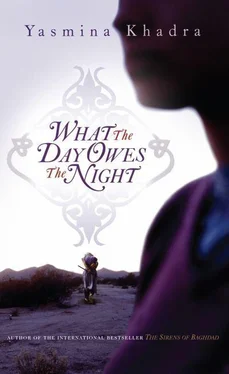These were strange times.
As for me, time marched on – I was becoming a man. I had grown almost twelve inches, and when I licked my lips, I could feel a little downy moustache.
It was the summer of 1942, and we were on the beach, sunning ourselves. The sea was crystalline and the horizon so clear that you could see all the way to the Habibas Islands. Fabrice and I were lounging under a sunshade while Simon, wearing a pair of revolting shorts, was entertaining the crowd doing ridiculous dives, hoping his antics might impress some girl, but his Apache war cries simply terrified the children and irritated the old ladies slumped in their deckchairs. Jean-Christophe was posing, holding his stomach in, hands on his hips, showing off the perfect V of his torso. Nearby, the Sosa boys had set up a tent. André loved to put on airs. Whereas other people brought deckchairs to the beach, he brought a tent; if they showed up with a tent, he would turn up with a whole caravanserai. At the age of eighteen, he already owned two cars, including a convertible. This he would drive lazily through the streets of Oran, except when it was time for siesta, when he would tear through Río Salado with an ear-splitting roar. Today, he could think of nothing better to do than mistreat his manservant Jelloul. He had already sent him back to the village three times in the blazing sun, the first time to get cigarettes, the second to get matches, and the third because Monsieur André had asked for Bastos cigarettes, not something that ‘a navvy might smoke’. The village was a fair distance and poor Jelloul was melting like an ice cube.
Fabrice and I had watched the scene play out from the beginning. André knew that the way he treated his manservant annoyed us and took malicious pleasure in winding us up. As soon as Jelloul got back, he sent him off a fourth time to get a tin-opener. The servant, a timid boy, turned on his heel stoically and headed back up the embankment in the sweltering afternoon heat.
‘Give him a break, Dédé,’ José said.
‘It’s the only way to keep him on his toes,’ said André, clasping his hands behind his neck. ‘Give him a break, and next minute he’ll be snoring.’
‘It’s a hundred degrees out there,’ pleaded Fabrice. ‘The poor guy is only flesh and blood, he’ll get sunstroke.’
José got to his feet to call Jelloul back. André grabbed his wrist and forced him to sit down again.
‘Leave it, José. You don’t have servants, you don’t know what it’s like . . . Arabs are like dogs, you have to beat them to get them to behave.’ Then, remembering that I was there, he corrected himself: ‘Well, some Arabs . . .’
Suddenly realising just how offensive his remark had been, he leapt to his feet and raced down to the sea. We watched him dive in, throwing up great sheets of spray. There was an uncomfortable silence in the tent. José clenched his jaw, finding it difficult to contain himself. Fabrice closed the book he had been reading and glared at me.
‘You need to give him a smack in the mouth, Jonas.’
‘What for?’ I asked wearily.
‘For what he says about Arabs. What he said was outrageous, I expected you to put him in his place.’
‘This is his place, Fabrice . . . I’m the one who doesn’t know my place.’
With that I grabbed my towel and headed back towards the road to hitchhike back to Río Salado. Fabrice came after me, tried to persuade me not to go home so early, but I felt sick at heart and the beach now seemed as bleak as a desert island. It was at that moment that a four-engine plane shattered the silence, appearing over the headland trailing a ribbon of smoke.
‘It’s on fire,’ José shouted, shocked. ‘It’s going to crash.’
The crippled plane disappeared beyond the ridge. Everyone on the beach was on their feet now, shading their eyes with their hands, waiting for an explosion or a cloud of smoke marking out the crash site. Nothing. The plane continued to coast, its engines stalled, but to the relief of everyone it did not crash.
Was this some terrible omen?
Some months later, on 7 November, as night fell over the deserted beach, monstrous shadows appeared on the horizon. The landings on the coast of Oran had begun.
‘Three shots fired,’ roared Pépé Rucillio. The man who rarely showed himself in public was standing on the village square. ‘Where is our valiant army?’
In Río Salado, news of the landings had been greeted like hail at harvest time. The men of the town had convened a meeting on the steps of the town hall. Some glowered with fury and disbelief while others, panic-stricken, had slumped and were sitting on the pavement, drumming their fingers on their knees. The mayor had rushed back to his office, where, according to those close to him, he was in constant contact with the military authorities at the barracks in Oran.
‘The Americans tricked us,’ roared Pépé, the richest man in the district. ‘While our soldiers were stationed in their bunkers, the enemy ships skirted the Montagne des Lions, bypassing our defences, and landed at Arzew without firing a shot. From there, they marched all the way to Tlélat without meeting a living soul, then advanced on Oran by the back door . . . While our troops were still keeping lookout on the clifftops, there were Americans strolling down the Boulevard Mascara. I’m telling you, there wasn’t so much as a skirmish! The enemy marched into Oran and made themselves right at home. What’s going to happen now?’
The day passed in a dizzying whirl of half-truths and wild rumours. Night fell, but no one seemed to notice – in fact most of the villagers did not go home until dawn. By now, they were disoriented. Some swore they could hear tanks roaring through the vineyards.
‘What kept you out so late?’ Germaine demanded, opening the door. ‘You’ve had me worried sick. Where have you been? The whole country is at war and you’re out wandering the streets . . .’
My uncle had emerged from his room. He was slumped in an armchair in the living room, unable to keep his hands still.
‘Is it true the Germans have landed?’ he asked me.
‘Not the Germans, the Americans.’
‘The Americans?’ He looked puzzled. ‘What the hell would the Americans be doing here?’
He jumped to his feet, looked about him contemptuously and announced: ‘I’m going to my room. When they get here, tell them I don’t have time to see them, tell them they can torch the house.’
No one came to torch our house, no air raid troubled the quiet of our fields. A couple of motorcyclists were spotted near Bouhadjar, the neighbouring village, but they turned out to be lost. They drove around for a while, then headed back the way they had come. Some said they were German soldiers, others said it was an American reconnaissance mission, but since no one had ever seen either army up close, we drew a line under the matter and went about our business.
André Sosa was the first of us to go to Oran.
He came back completely confused.
‘The Americans are buying up everything,’ he told us. ‘War or no war, they’re behaving like tourists. They’re all over Oran – in the bars, in the whorehouses, in the Jewish Quarter, they’ve even gone into the Village Nègre, against the express orders of their commander. They want everything: carpets, rugs, fezzes, burnous, tapestries. And they don’t even haggle! I saw one of them give a Moroccan veteran a wad of cash for just some rusty old bayonet from the Great War.’
He pulled a banknote from his back pocket and laid it on the table as though this were proof of what he had said.
‘Just look at what they do with their money . . . This is a hundred-dollar bill. Have you ever seen a French banknote scribbled over like this? They’re autographs. It’s stupid, but it’s the Yanks’ favourite game. They call it ‘Short Snorter’. You can do it with other notes too. Some of them have rolls of bills all like this. They’re not trying to get rich, they’re just collecting them. See those two autographs there, that’s Laurel and Hardy, I swear it is. That one there is Errol Flynn, you know, the guy who plays Zorro . . . Joe gave it to me for a crate of wine . . .’
Читать дальше












